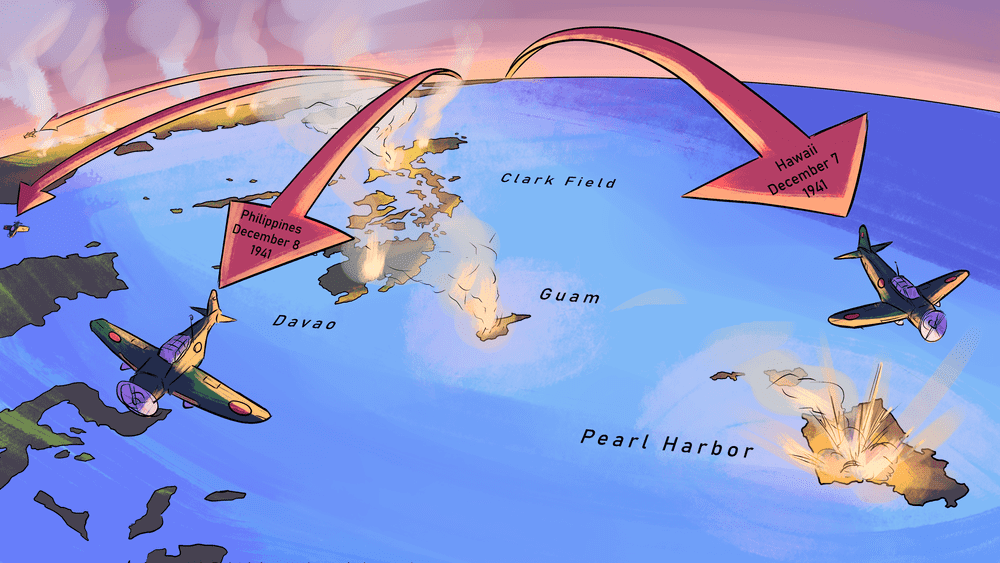Remembering Pearl Harbor – and the forgotten Filipino heroes of WWII

Near simultaneous devastating strikes by Japanese forces hit US military bases in Hawaii and the Philippines on the day of infamy. Photo from Dutytocountry.org
WASHINGTON D.C. – While Dec. 7, 1941 is a much-celebrated national memorial on the Japanese bombing of Pearl Harbor, much less is known or remembered about the Japanese attack on the Philippines on Dec. 8, 1941.
Among reasons cited by scholars: the time difference on the international time zone and a lesser-known US possession on the other side of the Pacific Ocean.
Thus, the Philippines was never mentioned by President Franklin D. Roosevelt, who nonetheless called the Japanese attack on American naval and military forces in Pearl Harbor as “a date which will live in infamy.”
Eighty-two years ago, Japanese fighter planes also attacked the Philippines, a US territory at the time. Five months earlier, President Roosevelt had issued a military order to Gen. Douglas MacArthur to establish and command the US Army Forces in the Far East (USAFEE), comprised of all US and Philippine military forces.
More than 250,000 Filipino soldiers responded to the President’s call-to-arms to defend a US territory in the Far East.
Despite being outmanned, ill-equipped and poorly trained, Filipino soldiers fought back fiercely and valiantly against the Japanese invasion. Half of them died in battle fighting under the American flag, making the ultimate sacrifice as USAFEE soldiers and as guerrilla fighters during the Japanese occupation.
Those who survived suffered the scars of battle and the invisible wounds of war. They also endured pain and humiliation when the US Congress passed the 1946 Rescission Act, which stripped them of their rights and promised benefits.
A memory of war
“My late mother, Maria – then 16 years old, remembers the invasion of Japanese forces on the northern shores of Luzon,” recalls Maj. Gen. Antonio Taguba (Ret), a son of a Filipino World War II veteran and chairman of the Filipino Veterans Recognition and Education Project (FilVetREP).
“There were no alerts to the villagers nor were there any USAFFE forces able to defend against the attack,” he said. “She and her family evacuated to southern villages to avoid capture.”
Taguba’s mother later made it to Manila to search for her aunt but was detained by Japanese forces and placed at the Santo Tomas detention camp, along with hundreds of American and Filipino detainees.
While there, she was able to assist American and Filipino nurses to care for civilian detainees who were mistreated and tortured.
“It matters that Dec. 7 and Dec. 8 be remembered in American history as the Day of Infamy separated by a time zone,” Taguba points out.
“Although Pearl Harbor was a temporary defeat of the US Pacific fleet, Hawaii was spared and not occupied by Japanese forces.”
On the other hand, the Japanese attack on the Philippines led to years of occupation, devastation and thousands of casualties, including prisoners of war, Taguba said.
“To honor these heroes, we commemorate the Bataan Death March and the fall of Corregidor that ensued after Dec 8,” he said.
Congressional Gold Medal
FilVetREP Vice Chair Marie Blanco said remembering the anniversary of “the day of infamy” and the courageous response of Filipino and American soldiers to call to duty, should serve as a reminder that their “uncommon valor should never be forgotten, that this American story should be preserved for posterity.”
“Always remembering what they did is the best way to protect our children and their children from the horrors of war,” she said.
To create greater awareness of their story of service and sacrifice, FilVetREP successfully secured legislation on Nov. 30, 2016, granting the Congressional Gold Medal to American and Filipino veterans of World War ll.
In a special ceremony on Oct. 25, 2017, Congress honored them with the highest civilian award. Granting them recognition after more than 70 years ensured that their story is now a significant part of US history.
FilVetREP’s second mission – to develop a national education program – has now been accomplished as well.
Called Duty to Country, this interactive online program fully documents the harrowing story of infamy in the Philippines, an historic event that inevitably drew the Philippines into a global conflict.
Thousands fought and died to liberate the country and preserve freedom and democracy in the United States.
“What happened in Pearl Harbor on Dec. 7 and in the Philippines on Dec. 8 are dates which will live in infamy, and must never be forgotten,” Taguba said.
For more information about Filipino WWII veterans and how to get involved, visit the FilVetREP website or their Facebook or X.

